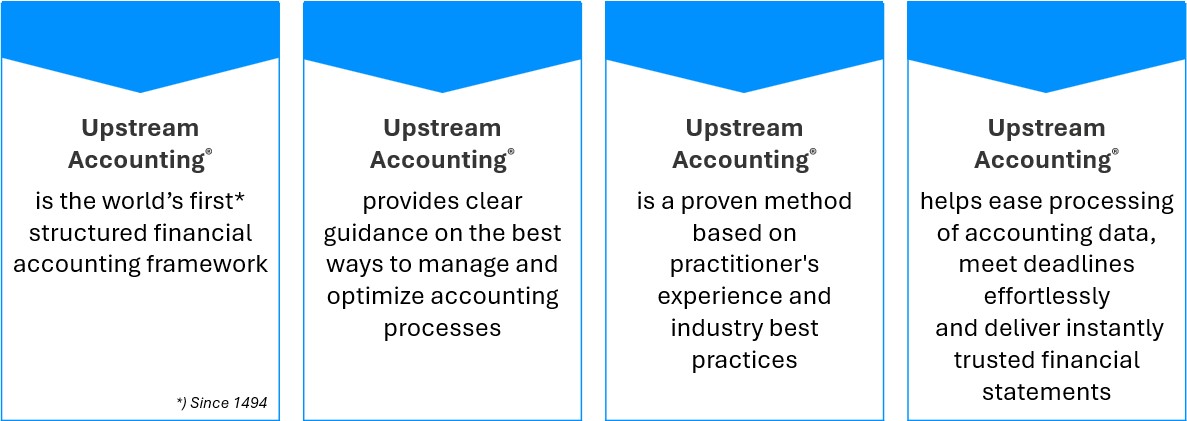The Upstream Accounting® Framework
Upstream Accounting® is a practical framework for managing accounting data from its source to reporting. It defines clear roles, ownership and principles, while providing tools and practices that help finance teams design smarter processes, ensure data integrity, and deliver financial insight that is instantly trusted. Designed to fit any organization, system or regulatory context, Upstream Accounting® evolves with changing requirements while bringing structure, clarity and discipline to the accounting lifecycle.


Six elements
Upstream Accounting® is built on six core modules that act as your compass in applying best practices, tools and templates. Together, they provide a practical roadmap for streamlining data collection, processing and recording accounting events in your trial balance
Structure and Improve
The Trial Balance
Driving to Best Practices
The ADM-cycle
Tools and Templates
Embedding the Approach

Discover the Framework
Structured practices, smart tools and team collaboration - all working together to capture accurate financial data at the source and streamline accounting processes: the curriculum of the modern accountant.

This module introduces the guiding principles of Upstream Accounting®, explaining how to streamline the recording of accounting events by capturing data at the source. It outlines the six elements and how these tie together to provide a structured, repeatable process for modern finance teams.

The scope of Source-to-Record is deliberately narrow: it focuses on the areas of financial accounting where manual journal entries can be optimized, made more efficient and executed with reduced risk.



The module focuses on mapping and redesigning financial workflows. It guides you through identifying high-impact processes, clarifying roles and responsibilities and building process models that support automation and data integrity.

Explore how to build strong data foundations by creating robust data models, implementing controlled data entry points and ensuring that source data remains clean and auditable. This module also touches on choosing the right tools for data management and analytics.

Discover strategies to sustain Upstream Accounting® by engaging teams across finance and operations. This module covers training, change management and building a culture of accountability so that the methodology becomes an integral part of your day-to-day operations.

This supporting module revisits the foundational concepts of financial accounting standards, controls and ethics, that underpin the entire framework. It ensures everyone speaks the same “common language,” so that data capture and recording it in the trial balance stay consistent across processes.

.png)
The ADM™ Cycle
With our five steps ADM-cycle you master the processes of Source-to-Record (S2R), Purchase-to-Pay (P2P), Order-to-Cash (O2C) and your Period-End Close





.svg)
.svg)
.svg)
.svg)
Join the Upstream Accounting Community
Are you passionate about shaping the future of accounting? We invite you to become part of the Upstream Accounting community — a collaborative space where professionals come together to build and evolve a forward-thinking accounting framework.
By joining us, you’ll have the opportunity to:
.svg)
.svg)
.svg)
.svg)
Whether you're an accountant, controller, finance lead or consultant — your voice matters. Let’s co-create the future of Upstream Accounting, together.
.png)
Who We Are
A robust cross-functional leadership portfolio is combined with extensive strategic and operational financial expertise.Practise areas including accounting, tax, compliance, credit management, treasury, and audit. An extensive experience, in business transformation and change, ensures strategic initiatives are aligned with global best practices and are ready to take full advantage of data automation and emerging innovations in AI. Organisational coaching and development combines academic insights with real-world application.
Our team brings a data-driven approach to finance transformation that is primed to deliver scalable, high-impact solutions to growing companies within complex multinational environments.
We provide a structured, transparent approach to organising the flow of accounting data, making it easier to understand, process, and prepare for the future.
.png)
Discover the Structural Shift in Accounting
Explore how Upstream Accounting® helps finance teams move beyond manual work, fragmented systems, and slow closes — toward a smarter, source-first future.


.svg)



.svg)

.svg)








.svg)


.png)